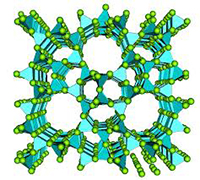1 L of zeolites/400 L tank water. Change every 6-8 weeks.
I can’t imagine it having much effect besides for a place for bacteria to grow.
I can’t imagine it having much effect besides for a place for bacteria to grow.
Follow along with the video below to see how to install our site as a web app on your home screen.
Note: This feature may not be available in some browsers.

Not sure I get that.
It is interesting to know your opinion on phosphate removal by zeolites. There were some papers (wastewater treatment related) stating zeolites can remove maximum 0.03 mg phosphorus per 1 gram zeolite which is not big deal but still something.
But is that a benefit? And does it bind even at the very low levels of ammonia typically present?
Any a capacity note, do you know how much zeolite is added how often, and has anyone calculated if the capacity at some low level of ammonia in seawater provides a meaningful effect?

Yes, I believe removal of some of the ammonium from tank water could be a benefit.
KZ recommend 1L per 400L tank water but from my experience it varies from tank to tank. I have used less (half of that if I recall correctly, it was more than 10 years ago) but have change it more frequently - every month I think instead of every 2-3 months.
I am sceptical zeolites can offer much of surface for the bacteria to grow, at least not much more than "normal" reef rock with the same size will offer. They are basically quite big chunks of rock and their pores are too small for bacteria to penetrate deep. Can not be compared with biomedias like Siporax.
Here is a picture of KZ Zeolites just to have impression of the size compared to my PC keyboard it is a 1 L bag

I can confirm after about 2-3 months zeolites somehow "stopping working" and nitrates starting to slowly rise. That could not be explained if they are just surface media. If it is like that they will offer the same surface for much longer time. It is actually the opposite If biomedia like siporax is used they start working much slower and can be used for years.

While that article also proposes things that I do not believe are accurate about zeolites, I certainly expect folks do get the bacterial growth on them, and I agree not in the fine pores. .

Zeolite in the reef aquarium
The term zeovit reactor is making its rounds on the aquarium forums and in fish store chatter more and more these days. To help clear any confusion, zeovit refereefs.com

I certainly agree there will be bacterial growth on them (I've seen it) I am still remember everyday shaking of stonesand I think they are excellent media for microorganisms.
But I am not convinced that 1 L of relatively large stones could offer big enough surface for bacteria to keep ammonium and respectively nitrate to undetectable levels in 100 gal normally fed tank with fish for 1-2 months. And I can ensure you from my experience zeolites can do that. Pretty sure 1L of normal reef rock with similar size and surface area will not. So there should be something else besides surface area that help zeolites reducing ammonium/nitrate leves and because there is scientific data that confirms zeolites can remove ammonium in seawater I assume they actually do this in our tanks too. That is my simple philosophy.
I don't doubt they remove some ammonia.

So you agree they remove some ammonia, I agree they provide some surface for bacteria. I think this is good achievement after 20 years of discussions.
Now we should find out which "some" is more. Let see what 2053 will bring)))
lollol
I think that is when the asterdoid hits earth.
Iol Actually one of the best natural looking reefs I have seen in person belonged to a man who I am sure never heard of zeolite and looked so bored and not interested when I was trying to explain him how bacteria in his tank are working . (but he was very polite and didn’t tell me he don’t careSometimes I think I’m too dumb for this hobby!

Perfect. I wanted to add denitrification media to my tank. @Roberto Denadai almost always used seachem matrix with no issues to his tank. He always got unreadable nitrates, too. It was apparently very effective in lowering nitrates without carbon dosing for him.The actual pores inside it are sized to bind ions inside them by a “tight fit”. Much too small for bacteria to enter. So no denitrification inside the pores.
Can low O2 regions exist in biofilms on the zeolite surface? Maybe, but then the exact nature of the zeolite would not be critical.

Thank you so much! I definitely will. I took my nitrate to “clear” on a salifert kit with vodka (same test and level as Roberto) and it rose to 0.5ppm the next day. Nitrogen starvation isn’t really an issue for me because I am observant and watch my tank multiple times a day.I’d just rinse the matrix well before adding it. Let us know how it works out!
I haven’t seen any benefit in nitrate management since adding Seachem Matrix media. I added a total of 10lbs of the media to my tank.I’d just rinse the matrix well before adding it. Let us know how it works out!
What App do you use for these readings? I like this.Thanks, these are my parameters from yesterday. I also run activated carbon in a small reactor, tank is 65g.

